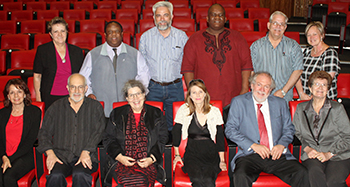Latest News Archive
Please select Category, Year, and then Month to display items
24 August 2021
|
Story Amanda Tongha
![]()
In a year marked by a global pandemic, the University of the Free State (UFS) has made great strides in research, teaching, and impactful engagement.
Our 2020 journey has seen many staff members providing services to advance public knowledge of COVID-19 for the greater good of South Africa. We have produced top-rated scientists, boasting six SARChI research chairs and three A-rated scholars in our world-class workforce. Our various initiatives to ensure student success continue to bear fruit, with current and former students making their mark in the world. One such example is Qinisani Qwabe, a PhD student in the Centre for Sustainable Agriculture, Rural Development and Extension, who was selected in the education category of the Mail & Guardian Top 200 Young South Africans. He was also chosen to represent South Africa at a BRICS conference in Russia.
You can read these and other facts and figures in ‘Our 2020 Journey’ publication.
Click on image to download the document

Special Edition of the Journal for New Generation Sciences launched at UFS
2016-10-26

Participants of the round-table discussion
at the launch of the Journal for New Generation
Sciences during the UFS Faculty of Education
colloquium which took place on 20 October 2016.
Photo: Oteng Mpete
The Journal for New Generation Sciences Special Edition was launched on 20 October 2016, at the Albert Wessels Auditorium, during the University of the Free State’s (UFS) Faculty of Education colloquium on the field of technological higher education and its contribution to the knowledge society.
Partnerships and knowledge production
Prof Laetus Lategan, Dean of Research and Innovation at the Central University of Technology (CUT), led the launch. “Higher education is not only about producing knowledge but it is also about fostering new relationships,” said Prof Lategan referring to CUT’s collaboration with the UFS Faculty of Education.
“Empowering people is important for capacity building, offering novice writers the opportunity to learn and a way to enhance their academic writing,” said Prof Lategan.
The Journal for New Generation Sciences is an accredited research publication in which scholars, internal and external to the institution, may publish. It accommodates national and international publications and showcases the university’s commitment to applied research.
Growing in leaps and bounds
According to Dr Somarie Holtzhausen, from the Faculty of Education’s School of Higher Education Studies, all papers are peer-reviewed by at least two experts. An editorial review also secures the quality of the paper. In 2014, when the journal was established, 30 contributions were submitted, although only 25 were successfully published.
“We turn down content not because it is not good, but unfortunately because it does not speak to the heart of the journal,” said Prof Lategan. With 60 peer reviewers, the journal’s contributors are assured that at least two peer reviewers will assess their article.
The Journal for New Generation Sciences supports both high-quality scholarly work of established researchers, and capacity building among new researchers.
During the round-table discussion various contributors to the journal spoke about their research and involvement in the publication of the journal.